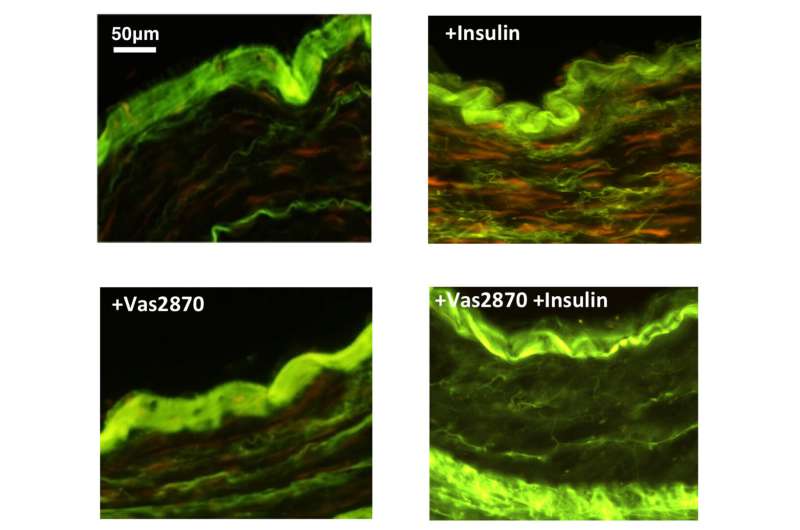Stained images of oxygen production (red) in response to insulin treatment in blood vessel tissue from patients with atherosclerosis. Credit: I. Akoumianakis et al., Science Translational Medicine (2020)
A team of researchers affiliated with institutions in the U.K., Greece and Germany has found a new way to treat insulin damaged blood vessels associated with heart disease. In their paper published in the journal Science Translational Medicine, the group describes how they studied blood vessels in multiple heart surgery patients and what they learned by doing so.
Atherosclerosis is a disease of the arteries that is characterized by fatty buildup on the inner walls—a condition that can lead to elevated blood pressure, heart attacks and strokes. Prior research has suggested that insulin can contribute to the development of atherosclerosis in diabetes patients—but thus far, it has not been clear how. Also complicating treatment is the lack of reversal of atherosclerosis in diabetes patients who are given medications to control insulin levels. In this new effort, the researchers conducted a study of blood vessels in patients with atherosclerosis who were having coronary bypass surgery to better understand the condition.
In all, the researchers analyzed the blood vessels of 674 patients and in so doing discovered a pattern—the blood vessels were resistant to insulin. This was a problem because insulin controls blood vessel tone, which is the process by which they are dilated. More open blood vessels allow more blood to pass through, whereas more constricted vessels allow less—which can lead to an increase in blood pressure. The researchers also found evidence of stress in the blood vessels due to oxygen molecules. And perhaps more importantly, they found that insulin led to problems with the cells that line the inside of the vessels. This was important because it meant it was treatable. To that end, the team treated both mice and human patients with an inhibitor of the enzyme DPP4, which reduced oxidative stress on the blood vessels. They found it also led to a reversal of vascular damage in both humans and mice fed a high-fat diet.
The animation explains that insulin treatment of patients with diabetes reduces glucose levels, but it causes significant direct damage on the human arteries by activating oxidative stress. Treating patients with a DPP4 inhibitor "sensitizes" the human arteries and makes them respond in the opposite way to insulin, i.e. insulin reduces vascular oxidative stress, becoming from a detrimental to a beneficial intervention. This means that treatment with DPP4 inhibitors may allow insulin treatment to reduce the risk for heart attacks and strokes in diabetics. Credit: Oxford Translational Cardiovascular Research Group
The researchers suggest their findings indicate that trials should be undertaken to test the possibility of adding DPP4 inhibitors to insulin treatment for diabetes patients to reduce atherosclerosis.
More information: Ioannis Akoumianakis et al. Insulin-induced vascular redox dysregulation in human atherosclerosis is ameliorated by dipeptidyl peptidase 4 inhibition, Science Translational Medicine (2020). DOI: 10.1126/scitranslmed.aav8824
Journal information: Science Translational Medicine
© 2020 Science X Network






















